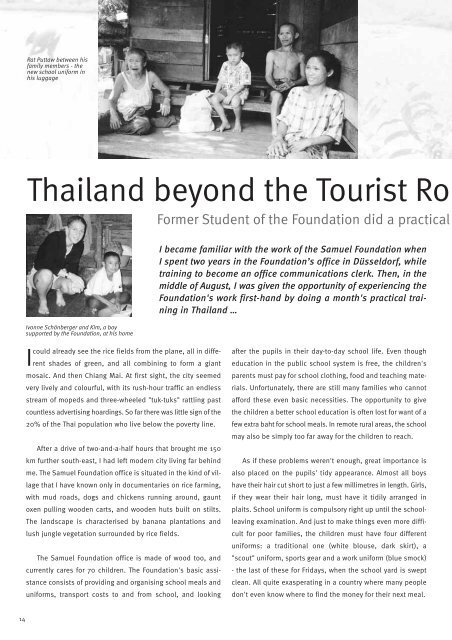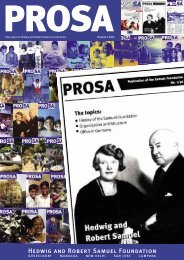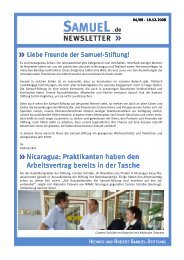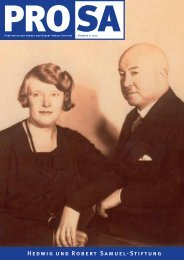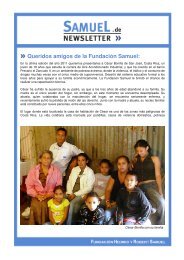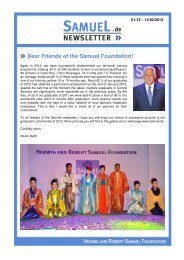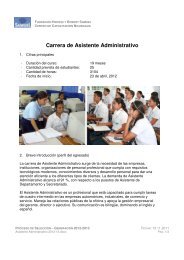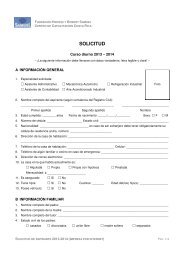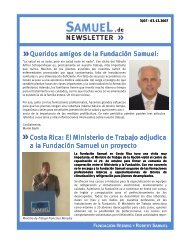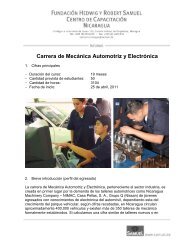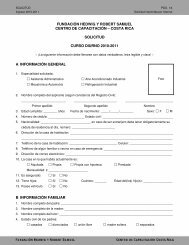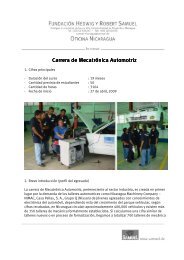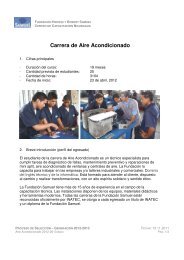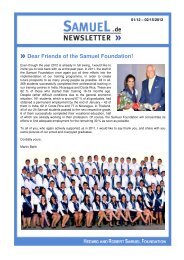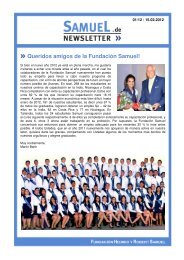Create successful ePaper yourself
Turn your PDF publications into a flip-book with our unique Google optimized e-Paper software.
14<br />
Rat Puttaw between his<br />
family members - the<br />
new school uniform in<br />
his luggage<br />
Thailand beyond the Tourist Ro<br />
Ivonne Schönberger and Kim, a boy<br />
supported by the Foundation, at his home<br />
Icould already see the rice fields from the plane, all in different<br />
shades of green, and all combining to form a giant<br />
mosaic. And then Chiang Mai. At first sight, the city seemed<br />
very lively and colourful, with its rush-hour traffic an endless<br />
stream of mopeds and three-wheeled "tuk-tuks" rattling past<br />
countless advertising hoardings. So far there was little sign of the<br />
20% of the Thai population who live below the poverty line.<br />
After a drive of two-and-a-half hours that brought me 150<br />
km further south-east, I had left modern city living far behind<br />
me. The <strong>Samuel</strong> Foundation office is situated in the kind of village<br />
that I have known only in documentaries on rice farming,<br />
with mud roads, dogs and chickens running around, gaunt<br />
oxen pulling wooden carts, and wooden huts built on stilts.<br />
The landscape is characterised by banana plantations and<br />
lush jungle vegetation surrounded by rice fields.<br />
The <strong>Samuel</strong> Foundation office is made of wood too, and<br />
currently cares for 70 children. The Foundation's basic assistance<br />
consists of providing and organising school meals and<br />
uniforms, transport costs to and from school, and looking<br />
Former Student of the Foundation did a practical<br />
I became familiar with the work of the <strong>Samuel</strong> Foundation when<br />
I spent two years in the Foundation’s office in Düsseldorf, while<br />
training to become an office communications clerk. Then, in the<br />
middle of August, I was given the opportunity of experiencing the<br />
Foundation's work first-hand by doing a month's practical training<br />
in Thailand …<br />
after the pupils in their day-to-day school life. Even though<br />
education in the public school system is free, the children's<br />
parents must pay for school clothing, food and teaching materials.<br />
Unfortunately, there are still many families who cannot<br />
afford these even basic necessities. The opportunity to give<br />
the children a better school education is often lost for want of a<br />
few extra baht for school meals. In remote rural areas, the school<br />
may also be simply too far away for the children to reach.<br />
As if these problems weren't enough, great importance is<br />
also placed on the pupils' tidy appearance. Almost all boys<br />
have their hair cut short to just a few millimetres in length. Girls,<br />
if they wear their hair long, must have it tidily arranged in<br />
plaits. School uniform is compulsory right up until the schoolleaving<br />
examination. And just to make things even more difficult<br />
for poor families, the children must have four different<br />
uniforms: a traditional one (white blouse, dark skirt), a<br />
"scout" uniform, sports gear and a work uniform (blue smock)<br />
- the last of these for Fridays, when the school yard is swept<br />
clean. All quite exasperating in a country where many people<br />
don't even know where to find the money for their next meal.


